| Listing 1 - 9 of 9 |
Sort by
|

ISBN: 070831483X Year: 2000 Publisher: Cardiff University of Wales press
Abstract | Keywords | Export | Availability | Bookmark
 Loading...
Loading...Choose an application
- Reference Manager
- EndNote
- RefWorks (Direct export to RefWorks)
Home rule --- Referendum --- Wales. --- Elections, 1999.
Book
ISBN: 8839711791 Year: 2001 Publisher: Turin : RAI-VQTP,
Abstract | Keywords | Export | Availability | Bookmark
 Loading...
Loading...Choose an application
- Reference Manager
- EndNote
- RefWorks (Direct export to RefWorks)
European Parliament --- Political campaigns --- Television in politics --- Elections, 1999.
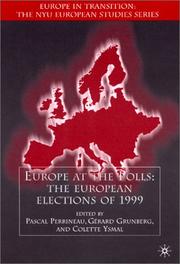
ISBN: 0312238959 Year: 2002 Publisher: Basingstoke Palgrave
Abstract | Keywords | Export | Availability | Bookmark
 Loading...
Loading...Choose an application
- Reference Manager
- EndNote
- RefWorks (Direct export to RefWorks)
European Parliament --- Elections, 1999 --- European Union countries --- Politics and government.
Book
ISBN: 2724608151 9782724608151 Year: 2000 Publisher: Paris Presses de sciences po
Abstract | Keywords | Export | Availability | Bookmark
 Loading...
Loading...Choose an application
- Reference Manager
- EndNote
- RefWorks (Direct export to RefWorks)
European Parliament --- Elections, 1999 --- European Union countries --- Politics and government --- #SBIB:023.AANKOOP --- #SBIB:324H42 --- #SBIB:327.7H221 --- Politieke structuren: verkiezingen --- Europees Parlement --- European Communities. Parliament --- Elections, 1999. --- Politics and government. --- European Union countries - Politics and government
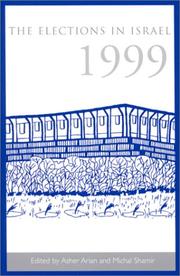
ISBN: 0791488810 0585463999 9780585463995 0791453154 9780791453155 0791453162 9780791453162 9780791488812 Year: 2002 Publisher: Albany : State University of New York Press,
Abstract | Keywords | Export | Availability | Bookmark
 Loading...
Loading...Choose an application
- Reference Manager
- EndNote
- RefWorks (Direct export to RefWorks)
This volume highlights Israel's 1999 elections, in which the prime-ministerial race between incumbent Benjamin Netanyahu and Ehud Barak ended with Barak winning by the biggest landslide ever in Israel. Although some observers interpreted these results as a fundamental shift in public opinion, there is little evidence to support this. The book shows how old patterns funneled into a new system of voting produced the 1999 results, where a weak candidate (Barak) bested a wounded prime minister (Netanyahu) abandoned by most of his political allies. Leading social scientists from Israeli and American universities, using a variety of approaches and coming from diverse intellectual traditions, address topics including the emergence of political blocs, strategic voting, and split ticket voting. In addition to major party performance, special interest parties—who did better than ever in 1999—are also discussed, such as the haredi, ultra-orthodox, non-Zionist Shas, the anti-haredi secular Shinui, two parties appealing to former Soviet émigrés and Arab parties.
Elections --- Israel. --- ישראל. --- כנסת --- כנסת השתים־עשרה --- Elections, 1999. --- Israel --- Politics and government --- Israël --- Politique et gouvernement
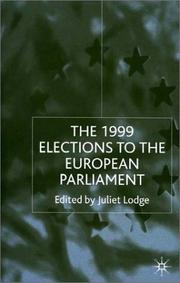
ISBN: 0333800427 Year: 2001 Publisher: Basingstoke Palgrave
Abstract | Keywords | Export | Availability | Bookmark
 Loading...
Loading...Choose an application
- Reference Manager
- EndNote
- RefWorks (Direct export to RefWorks)
Government --- European Union --- #SBIB:044.AANKOOP --- #SBIB:327.7H221 --- #SBIB:324H42 --- Europees Parlement --- Politieke structuren: verkiezingen --- European Parliament --- -Eurōpaiko Koinovoulio --- Europäisches Parlament --- Parlement européen --- Parlamento europeo --- Europese Parlement --- Europa-Parlament --- Parlament Europeu --- Parlament Europejski --- Ōshū Gikai --- Parlamento della Comunità europea --- Parlamento Europeu --- EUROPARL --- European Union. --- European Parliamentary Assembly --- Elections, 1999 --- -Elections, 1999 --- -European Communities. Parliament --- European Communities. Parliament --- Elections, 1999.
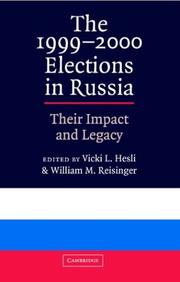
ISBN: 0521816769 9780521016964 9780521816762 9780511550355 0521016967 0511550359 0511889151 Year: 2003 Publisher: Cambridge Cambridge University Press
Abstract | Keywords | Export | Availability | Bookmark
 Loading...
Loading...Choose an application
- Reference Manager
- EndNote
- RefWorks (Direct export to RefWorks)
In this volume, which was originally published in 2003, a distinguished collection of specialists analyzes the critical elections that ushered out the Boris Yeltsin era in Russia and ushered in the leadership of Vladimir Putin. These parliamentary and presidential elections were critical for the future of Russia and are highly enlightening to scholars and students of electoral politics, party development and democratization. Collectively, the expertise represented by these authors extends to all the important facets of electoral politics and party development in Russia.
Elections --- Political campaigns --- Political parties --- Presidents --- Presidency --- Heads of state --- Executive power --- Election --- Russia (Federation). --- Gosduma (Russia : 1993- ) --- Russian State Duma (Russia : 1993- ) --- Duma (Russia : 1993- ) --- Elections, 1999. --- Russia (Federation) --- Politics and government --- Elections, 1999 --- Campagnes électorales --- Partis politiques --- Présidents --- Russie --- Politique et gouvernement --- Russia (Federation). Federal'noe Sobranie. Gosudarstvennaia Duma --- 2000 --- 1991 --- -Russia (Federation). Federal'noe Sobranie. Gosudarstvennaia Duma --- -Elections --- Elections - Russia (Federation) --- Presidents - Russia (Federation) - Election - 2000 --- Political campaigns - Russia (Federation) --- Political parties - Russia (Federation) --- Russia (Federation) - Politics and government - 1991 --- -Social Sciences --- Political Science --- -Elections - Russia (Federation) --- Gosudarstvennai︠a︡ Duma Rossiĭskoĭ Federat︠s︡ii --- Gosduma FS RF --- Social Sciences
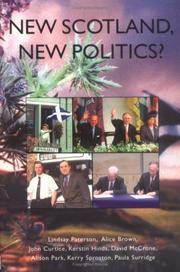
ISBN: 0585441782 9780585441788 1902930258 9781902930251 Year: 2022 Publisher: Edinburgh
Abstract | Keywords | Export | Availability | Bookmark
 Loading...
Loading...Choose an application
- Reference Manager
- EndNote
- RefWorks (Direct export to RefWorks)
What are Scots' expectations of their new Parliament? What influenced them when they were casting their votes in the first elections? What social policies do they want the Parliament to pursue? How do they see the future of Scotland's relationship with the rest of the UK and the rest of Europe? And how does the country's new constitutional status relate to people's sense of national identity?The book analyses Scotland's first parliamentary election in May 1999, and looks to the future of Scottish politics, Scottish social attitudes and Scotland's relationship with the rest of the United Kingdom. Written by the leading authorities on Scottish politics and society, it provides a definitive account of social and political attitudes in Scotland at the beginning of the new parliamentary democracy, and at a time when Scotland's relationship with the rest of the United Kingdom is undergoing radical change.
Home rule --- Public opinion --- Government - Europe --- Government - Non-U.S. --- Law, Politics & Government --- Opinion, Public --- Perception, Public --- Popular opinion --- Public perception --- Public perceptions --- Judgment --- Social psychology --- Attitude (Psychology) --- Focus groups --- Reputation --- Home rule (Scotland) --- Scotland. --- Elections, 1999. --- Scotland --- Politics and government. --- Pà̀rlamaid na h-Alba --- Scots Commission in London --- Scottish Parliament
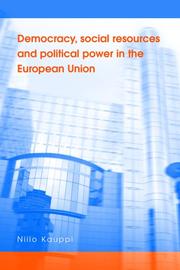
ISBN: 9787190705 0719070589 9781526130334 1526130335 9780719070587 Year: 2017 Publisher: [Place of publication not identified]
Abstract | Keywords | Export | Availability | Bookmark
 Loading...
Loading...Choose an application
- Reference Manager
- EndNote
- RefWorks (Direct export to RefWorks)
In this book Kauppi develops a structural constructivist theory of the European Union and critically analyses, through French and Finnish empirical cases, the political practices that maintain the Union's 'democratic deficit'. "In this book Kauppi develops a structural constructivist theory of the European Union and critically analyses, through French and Finnish empirical cases, the political practices that maintain the Union's 'democratic deficit'. Kauppi conceptualises the European Union as both an arena for political contention and a nascent political order. In this evolving, multi-levelled European political field, individuals and groups construct material and symbolic structures of political power, grounded in a variety of social resources such as nationality, culture, and gender. The author shows how the dominance of both executive political resources and domestic political cultures has prevented the development of European democracy. Supranational executive networks have become more autonomous, reinforcing the dominance of the resources they control. At the same time, national political cultures condition the political status of elected institutions such as the European parliament. The book is particularly suited for undergraduate and graduate students in the fields of European Politics, European Union Studies and International Relations." --Back cover.
Democracy --- Démocratie --- European Union. --- European Union countries --- Pays de l'Union européenne --- Politics and government. --- Politique et gouvernement --- European Parliament --- E.U. --- European Communities. Parliament --- Elections, 1999. --- Politics --- Eu & European Institutions --- POLITICAL SCIENCE / History & Theory --- Political science & theory --- European Parliament elections. --- European integration. --- European politics. --- European security structure. --- French political traditions. --- French post-imperialist syndrome. --- democratic deficit. --- democratic stalemate. --- identity politics. --- legislative legitimacy. --- postabsolutist polities. --- postnational polities. --- structural constructivism. --- supranational institutions.
| Listing 1 - 9 of 9 |
Sort by
|

 Search
Search Feedback
Feedback About UniCat
About UniCat  Help
Help News
News